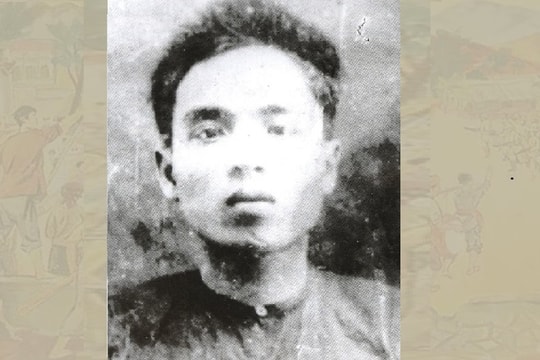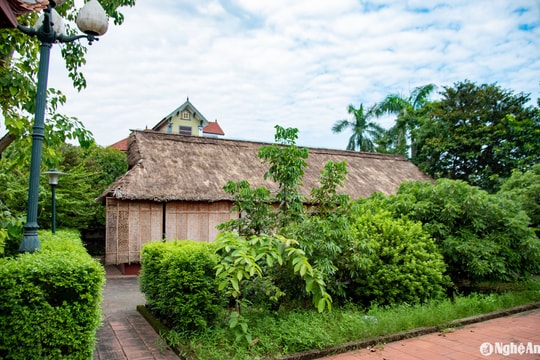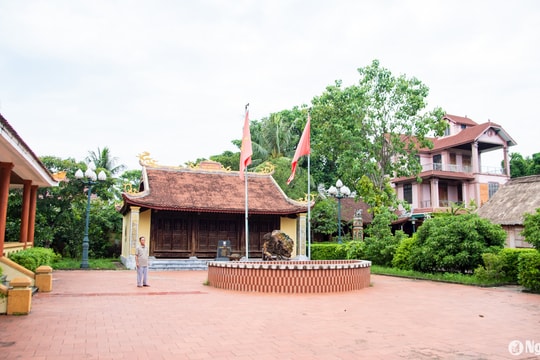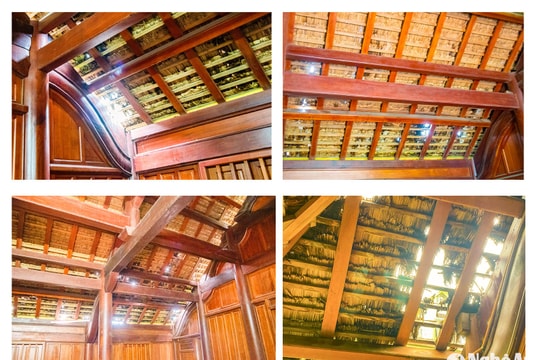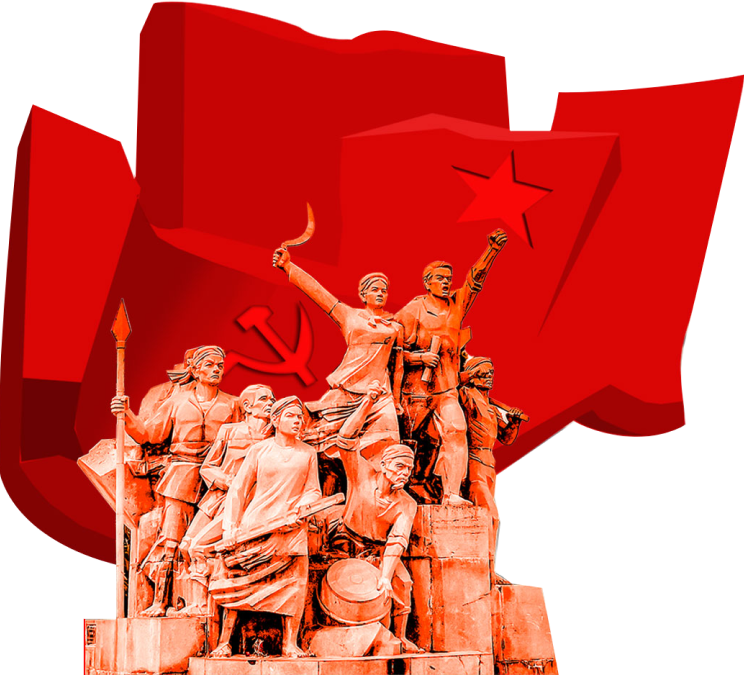Nguyen Duy Trinh - A typical revolutionary soldier in the heroic Soviet homeland
At 75 years old, 57 years of Party membership, and nearly 60 years of continuous revolutionary activities in the three regions of Central, South, and North, comrade Nguyen Duy Trinh is a soldier of the first guard class of the Party, a loyal and close student of President Ho Chi Minh.
The outstanding son of Nghe An homeland
Comrade Nguyen Duy Trinh, whose real name is Nguyen Dinh Bien, was born on July 15, 1910, in Co Dan village, Dang Xa commune (now hamlet 12, Phuc Tho commune), Nghi Loc district, Nghe An province. This land is rich in historical traditions, a sacred place that gives birth to heroes and talented people, making the tradition famous in both martial arts and literature. Comrade Nguyen Duy Trinh is the 15th generation descendant of the founder Grand Tutor Cuong Quoc Cong Nguyen Xi.
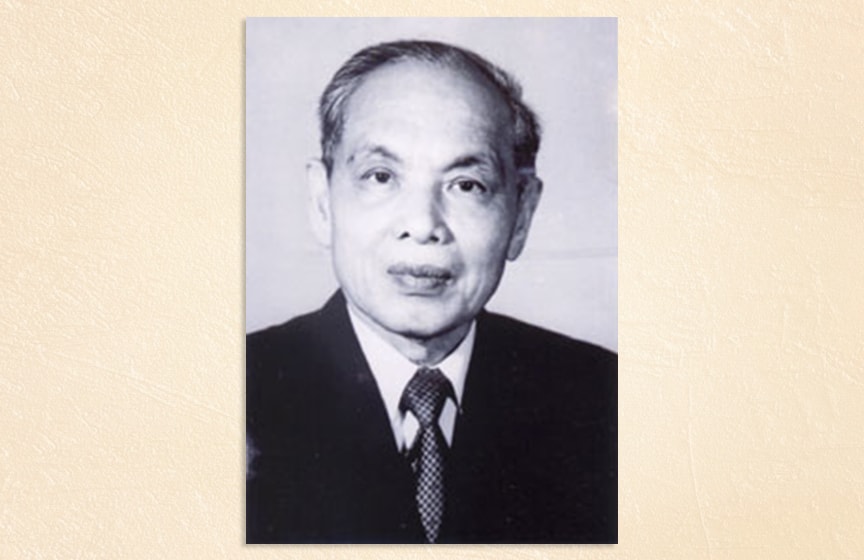 |
| Former Foreign Minister Nguyen Duy Trinh. Photo courtesy |
As a child, Nguyen Dinh Bien was tutored by his father, Bachelor Nguyen Dinh Tiep, and then studied the national language in Dang Xa. Being intelligent and bright, good at both Chinese and French, at the age of 12, Nguyen Dinh Bien was sent by his family to study at Vinh National School. In 1924, he was a student of teacher Tran Phu. Nguyen Dinh Bien soon joined the student movement against colonial feudal oppression, demanding freedom of political activities in Vinh such as: attending the memorial service for patriotic scholar Phan Chu Trinh, signing the petition demanding the French colonialists to release Phan Boi Chau...
In 1928, Nguyen Dinh Bien joined the Tan Viet Party - one of the predecessor organizations of the Communist Party of Vietnam, and was then assigned by the organization to operate in Saigon-Gia Dinh. To avoid being hunted by secret police, he changed his name to Nguyen Duy Trinh - a name that followed him throughout his life of steadfast revolutionary activities. At the end of 1928, Nguyen Duy Trinh was arrested by the French at a Tan Viet office in Saigon. Unable to obtain any information, in July 1930, the Governor of Cochinchina (Jean-Félix Krautheimer) signed a decree to deport Nguyen Duy Trinh to his hometown to limit the risk of revolutionary seeds.
The leading flag in the Nghe Tinh Soviet movement
On December 28, 1930, responding to the call of the Central Region Party Committee to organize a memorial service for the fallen soldiers, comrade Nguyen Duy Trinh and the Party committees at all levels in Nghi Loc led the Red Peasant Association, the Women's Liberation Association, the Communist Youth Union... in coordination with the Vinh - Ben Thuy Provincial Party Committee to mobilize thousands of Nghi Loc people along with factory workers, Vinh town people and Hung Nguyen district to gather at Dam Mu Nuoi, Loc Da village (Hung Loc) to attend the ceremony. This movement was reflected by comrade Nguyen Ai Quoc in the article "Red Nghe Tinh" sent to the Eastern Department of the Communist International on February 19, 1931.
On the morning of January 2, 1931, District Chief Ton That Hoan brought soldiers to the house of the village chief of Song Loc village to suppress the masses and arrest two revolutionary families. With great hatred, the revolutionary spirit seethed, the masses rose up to kill District Chief Ton That Hoan, Deputy Chief of Can Tho Dang Xa, Deputy Chief of Can Tho, Chief of Song Loc village and 5 soldiers in front of the banyan tree of Chinh Vi temple. Faced with that situation, comrade Nguyen Duy Trinh led the Party cells and the executive committee of the Red Farmers' Association to hold an emergency meeting to discuss countermeasures. He sent cadres to coordinate with the Party cells, on the one hand, sent the exposed cadres and Party members to operate elsewhere, and held a meeting with the Red Farmers' Association members to discuss the plan to deal with the enemy when they came to suppress, preparing the people's spirit of struggle.
During this period, under the leadership of comrade Nguyen Duy Trinh, the Party organization in Nghi Loc district developed from 15 branches with 58 members to 23 branches with 162 members, the Red Farmers' Association developed from 1,574 members operating in 19 villages to 4,926 members. In addition, there were 118 members of the Women's Liberation Association, 64 members of the Communist Youth Union and dozens of members of the Red Relief Association and the Association for Supporting the Revolution...
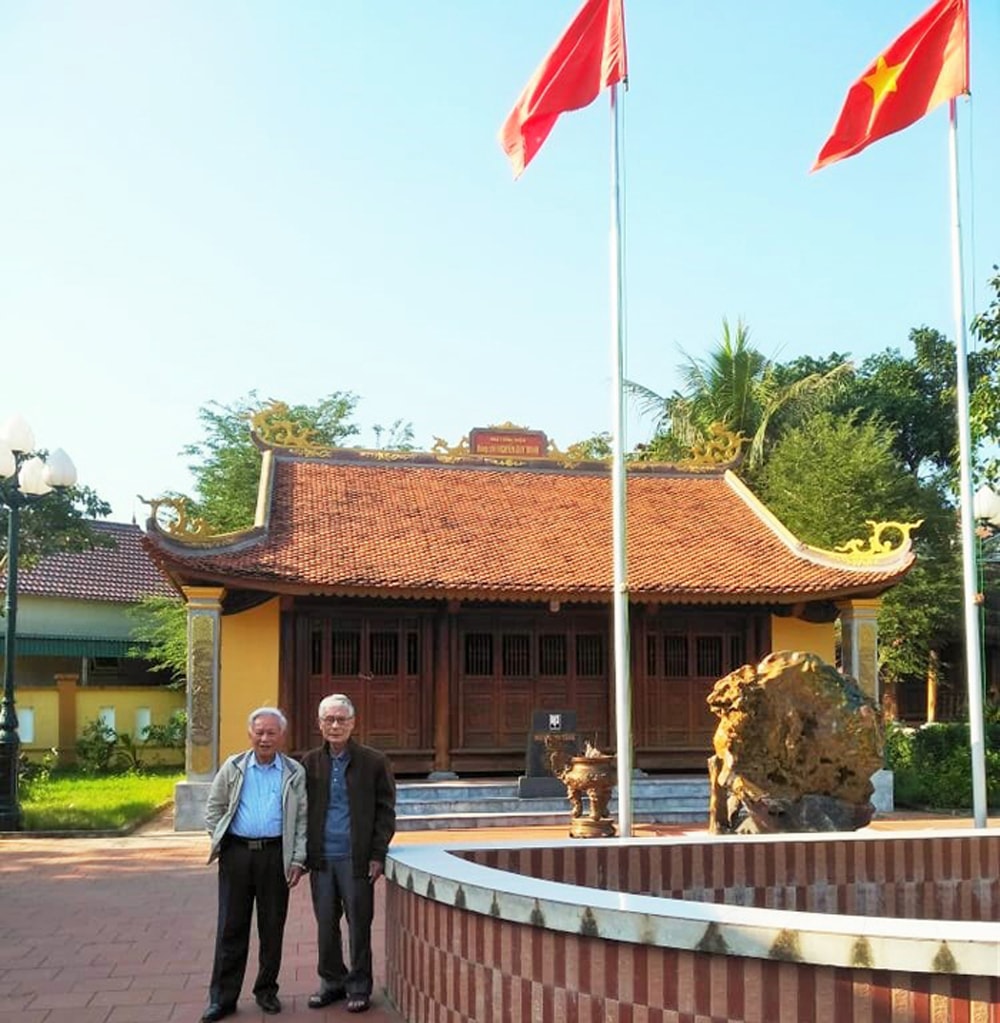 |
| Memorial site of diplomat Nguyen Duy Trinh in hamlet 10, Phuc Tho commune (Nghi Loc). Photo: Giao Huong |
However, after a short time, the French colonialists and the feudal Southern Dynasty government quickly concentrated their forces to destroy the achievements of the Nghe Tinh Soviet. They built a dense system of military posts in Nghi Loc. In April 1931, in a poor hamlet in Duc Thinh village on the way to Cua Hoi, under the chairmanship of comrade Nguyen Duy Trinh, the comrades held a meeting to discuss plans and establish a new District Party Committee cadre board, continuing to maintain the Party's activities. The conference elected comrade Nguyen Duy Trinh as the new Nghi Loc District Party Committee Secretary.
After the conference, comrade Nguyen Duy Trinh and the Executive Committee tried to contact the Central Region Party Committee stationed at Ben Thuy. At the end of April 1931, comrade Nguyen Duy Trinh attended the expanded conference of the Central Region Party Committee chaired by comrade Nguyen Phong Sac - Central Committee member of the Party.
The enemy carried out policies of suppressing the movement with the most ferocious terrorist attacks, carried out many bloody massacres, causing heavy losses to the movement. The revolutionary government in all communes collapsed. In the face of the dire situation, comrade Nguyen Duy Trinh was not discouraged, continuing to establish contact with party members who had not yet fallen into the enemy's net. On the one hand, the comrades patiently sought ways to overcome difficulties, maintain the local revolutionary movement, and gradually retreat into secrecy. On January 18, 1932, comrade Nguyen Duy Trinh fell into the enemy's net.
Upholding revolutionary spirit in feudal colonial prisons
At the end of November 1928, comrade Nguyen Duy Trinh was arrested for the first time. He was taken by the French colonialists to the Saigon Central Prison. However, according to the documents at that time, he was not yet a minor, so he was locked up in a juvenile prison. In that environment, comrade Nguyen Duy Trinh took advantage of the time to review the "training lessons" he had learned and to focus on reforming his "fellow prisoners". During this time, comrade Nguyen Duy Trinh got to know many other patriots such as Nguyen An Ninh, Nguyen Thuc Bao and especially comrade Ton Duc Thang.
In July 1930, the French colonialists brought Nguyen Duy Trinh and those suspected of being involved in the case at house number 7, Barbier Street, Saigon to trial. Nguyen Duy Trinh was sentenced to 18 months in prison by the French colonialists, but immediately after that, the Governor of Cochinchina signed a decree to deport him to Nghe An. Sending Nguyen Duy Trinh “back to his homeland” was like the French colonialists “releasing the tiger back into the forest” because the revolutionary fire in him had never been extinguished and it flared up even more strongly when tempered by the whips of the imperialist prison.
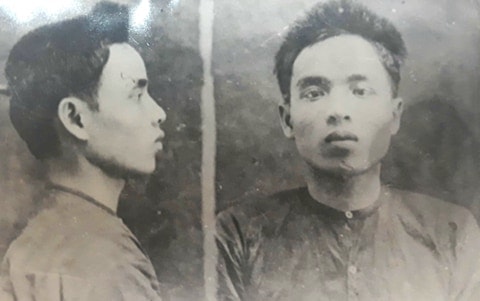 |
| Comrade Nguyen Duy Trinh during his imprisonment. Photo taken by French secret agents, kept at the Security Records Department. |
On January 18, 1932, he was arrested by the French colonialists for the second time due to the information of a traitor. Having captured Nguyen Duy Trinh, the French colonialists and their henchmen used all forms from bribery to brutal torture in an attempt to change his will, but they all failed. Helpless, they gave him a cursory trial and then sent him to Buon Ma Thuot Prison.
In June 1935, comrade Nguyen Duy Trinh and 5 others were exiled to Con Dao by the French colonialists. Here, comrade Nguyen Duy Trinh met other loyal communists who were being detained such as: Ton Duc Thang, Pham Van Dong, Pham Hung, Le Van Luong, Nguyen Van Hoan, Le Duc Tho... In June 1936, comrade Nguyen Duy Trinh was elected as Secretary, comrades Ho Van Long, Pham Hung, Le Van Luong as Party Committee members. Under the leadership of comrade Nguyen Duy Trinh, party members continued to deeply research many issues of Marxism-Leninism, and intensified the propaganda of Marxism-Leninism to prisoners.
On December 19, 1941, comrade Nguyen Duy Trinh's prison term ended. The French colonialists did not release him but instead imprisoned him in Daklei camp. Here, Nguyen Duy Trinh and other key comrades organized revolutionary theory studies. Comrade Nguyen Duy Trinh was the Head of the Marxist-Leninist theory and Party guidelines department.
In early 1943, Nguyen Duy Trinh, along with comrades Chu Huy Man, Huynh Ngoc Hue and Ha The Hanh, organized a prison break from Daklei.
Later, comrade Nguyen Duy Trinh was re-arrested. In May 1945, comrade Nguyen Duy Trinh was released, quickly contacted the organization and participated in the General Uprising in Vinh and Hue cities. After the August Revolution, he successively held many leadership positions at the local and central levels. No matter what position he held, comrade Nguyen Duy Trinh always promoted the revolutionary qualities of a staunch communist soldier.
A shining example of a cadre, exemplary, lifelong dedication to the revolutionary cause
The dynamism in the arduous and sacrificial practice that Comrade Nguyen Duy Trinh experienced contributed to the formation of the correct revolutionary viewpoint and line with our Party. In his capacity as Minister of Foreign Affairs, Comrade Nguyen Duy Trinh participated in many conferences of the Politburo, the Central Committee and the Government to develop and perfect the Party's foreign policy and line, in accordance with the situation, in order to unite and gather international forces to understand Vietnam correctly, to help and support Vietnam in fighting the US.
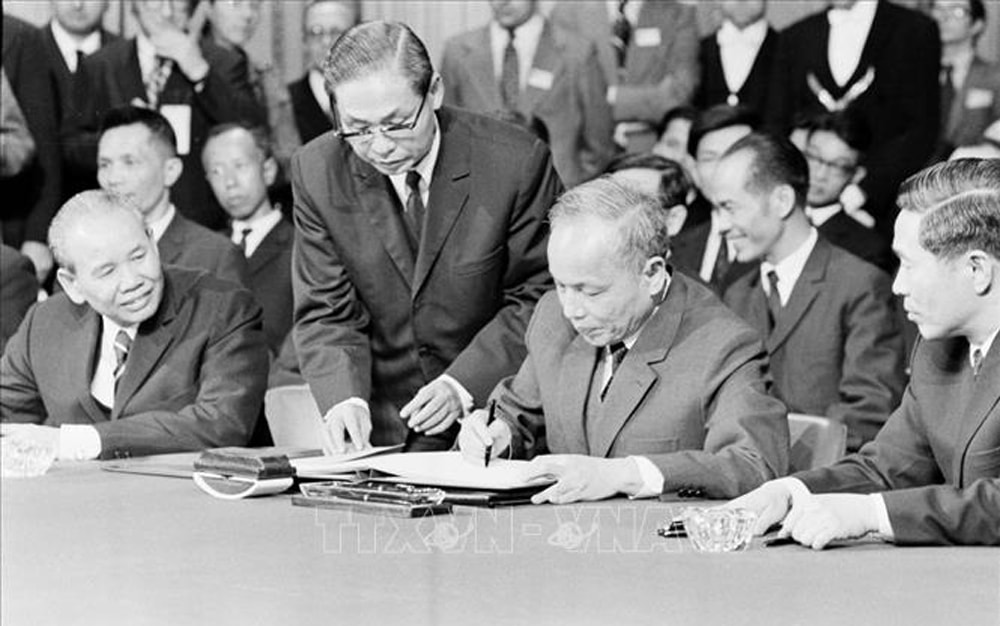 |
| Comrade Nguyen Duy Trinh signed the Paris Agreement on Vietnam. Photo: VNA |
It was not only a victory in politics and diplomacy but also in economics and national defense, ensuring resources as well as the very necessary support for our people's war against the invading American imperialists to reach final victory. Our Fatherland and people will forever remember the intellectual talent of Comrade Nguyen Duy Trinh, who held many high-ranking positions of the Party and State, especially 26 years as a member of the Politburo, 15 years as Deputy Prime Minister and Minister of Foreign Affairs, contributing significantly to the common victory of the entire nation. The experience and lessons that Comrade Nguyen Duy Trinh left on the diplomatic front still have value for our international integration process today.
Comrade Nguyen Duy Trinh lived a simple, frugal life, and loved the people. These were virtues that he inherited from his family and homeland and were nurtured throughout his life. Not during the period of hardship and deprivation, but after the revolution succeeded, and the Party was in power, he himself became a high-ranking official. He still maintained a simple, frugal, and harmonious lifestyle, but his soul was pure, leisurely, and free. With such talent and moral qualities, Comrade Nguyen Duy Trinh is truly a shining example for successive generations to learn and follow.

